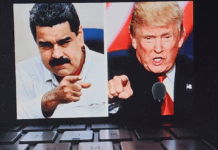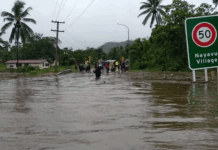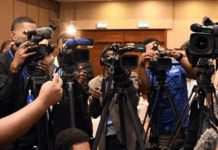
ANALYSIS: By Marwan Bishara
The French have done it again. Despite having been utterly scandalised by the result of their own vote in the 2017 presidential elections, they have propelled the unpalatable Emmanuel Macron and the deplorable Marine Le Pen to yet another runoff.
But such is the state of French politics — chaotic and in flux. Now, the power of the traditional centre-left and centre-right parties has diminished, and the Fifth Republic is changing beyond recognition, with dramatic consequences for Europe.
After five years in power, the incumbent won only 28 percent of the vote in comparison with Le Pen’s 23 percent in the first round two weeks ago, and the result of the second round, due to take place tomorrow, looks even less certain than ever, considering Macron’s controversial domestic and foreign policy record.
- READ MORE: French Pacific readies for presidential election as Macron seeks second term
- Kanak pro-independence parties urge supporters to boycott French election
In 2017, Marcon defeated Le Pen by 30 points, but today she’s too close for comfort, with some polls putting them almost at the same level, given the 3 percent margin of error. Although some polls have also shown him opening a significant lead.
Predictably, most of the other candidates have lent their support to Macron as he rushed to emphasise Le Pen’s “extremism” and present an ultimatum: It is me or the far right (read the neofascists), or in the words oft attributed to King Louis XV, “After me, the deluge”.
But the trick may not work as well as it did the last time, because this time it smacks of despair and duplicity.
The president looks desperate if he chooses to focus on Le Pen’s record instead of focusing on his own, especially now that he has a record to run on. And he looks desperate if he engages in the politics of fear instead of laying out a hopeful agenda for the next crucial five years.
Neither the pain nor the gain has spread evenly
In terms of numbers, and considering Brexit, the pandemic, and the Russian invasion of Ukraine, Macron has actually done better than expected for the French economy as a whole; better than most other Western economies.
Yet, neither the pain nor the gain has spread evenly during his term.
Despite lower unemployment and higher growth, Macron is widely seen as a “president of the rich”, focused on improving corporate performance as the engine of growth, investing more in white-collar jobs than in blue-collar labour, and showing no sympathy for struggling families.
Macron has proven a good speaker but a bad communicator; better at lecturing than listening, condescendingly talking at people instead of talking to them.
Some now fear that, free of electoral pressures in his second and final term in office, Macron could become even more indifferent, raising the retirement age, undermining labour rights and shrinking the welfare state to suit his neoliberal economic agenda.
Either way, Macron should have mustered the courage in the past two weeks and beyond to set the record straight about where he is taking the country. This is especially important because Macron also needs to come clean about a record of double standards.
He, who had appealed for “hope over fear”, was quick to spread panic about so-called “Islamist separatism” during his presidency, in an opportunistic manoeuvre to deflect attention from his failures and salvage his waning popularity on the right.
Le tour de l’actualité du jeudi 21 avril en #nouvellecaledonie https://t.co/70wucLZaG1 pic.twitter.com/MvMMsxmWA6
— Les Nouvelles calédoniennes (@lncnc) April 20, 2022
Accused Muslims of living on margins
He accused Muslims living on the margins of French society of offending democratic and secular values, instead of fulfilling his promise to end social marginalisation in France.
In the process, he paved the way for the likes of populist candidate Eric Zemmour to claim Islamists and Muslims are one and the same; demonising Islam as an imminent danger to the French republic.
Paradoxically, just as Macron embraced such a xenophobic image, Le Pen shed hers in order to appeal to mainstream conservative voters.
Though she has not changed her fanatic views or chauvinistic agenda, the far-right candidate has replaced her image as an angry extremist, obsessed with immigration, Islam and French identity, with a more moderate one of a warm caring leader, speaking to peoples’ economic and personal anxieties.
Instead of her usual rants against EU authoritarianism, Le Pen has railed against high prices and high taxes in order to rally her base.
Le Pen’s clever but deceiving repositioning has allowed her to make inroads to the political centre without losing the radical right, and propelled her to the top of the polling charts along with Macron, despite her dark past and her admiration for Vladimir Putin and Donald Trump, both very unpopular in France.
She has long shared Putin and Trump’s vision of nativist white Christian nationalism, but understood that French voters today are fixated on domestic woes, not on foreign worries, and therefore spoke only in slogans about making France strong, authentic and great again.
Activist president on world stage
But Macron has been an activist president on the European and world stage, believing that France must lead on both fronts. What he lacked in experience, he made up for in youthful energy, bouncing about world forums, hosting important leaders and expressing an opinion on every issue.
Yet despite his energy and ambition, Macron has fared worse on foreign policy than he did domestically. Not only did he fail to make any breakthroughs on any major issue, but much of what he touched also seemed to blow up in his face.
In Europe, he failed to score any gains in his so-called “Normandy format” summit in 2019 and later failed to anticipate, prevent or reverse a Russian invasion of Ukraine. In the process, his vision of European defence autonomy at the expense of a “brain-dead” NATO dissipated to no return.
In Africa and the Middle East, Macron failed to preserve or expand French influence, especially in the Sahel and North Africa. He also fared miserably in Libya, Lebanon and in Palestine despite PR stunts on the streets of Beirut and Jerusalem.
His hastily arranged photo-op with warring Libyan leaders early in his presidency underlined his amateurish approach to foreign policy, as the conflict hardened and France’s role waned. Macron’s appeasement of authoritarian Arab regimes while preaching human rights has been utterly hypocritical.
Macron has lost huge multibillion-dollar arms deals to the United States, including those with the Australian navy and European air forces. Unable to make up his mind about Beijing, or settle on a strategy, he failed to create any form of partnership or make economic inroads with China.
And yet again, it is the immediate bread-and-butter (and, ahem, cheese) issues that count most for the French in these elections, not far-off conflicts and conspiracies.
Macron and Le Pen clash over Russia, hijabs in fractious debate https://t.co/fprafErGgI
— Al Jazeera English (@AJEnglish) April 21, 2022
Faced and debated Le Pen
So far, President Macron has used France’s turn at the presidency of the European Union and the threat Russia’s invasion of Ukraine poses to European security to avoid debating other candidates or defending his record — until this week’s traditional television debate.
He faced and debated Marine Le Pen, who is much better prepared, more polished and experienced than the last time. Any major faux pas in the next two weeks could have cost him the presidency, but he seems to have the edge as demonstrated in the debate.
Winning back the Elysees is not the only challenge facing him. He will also have to win back the majority in the National Assembly come June legislative elections, in order to pass any major laws or programmes.
It should come as no comfort for the incumbent that his victory was driven, not once but twice, by the electorate’s fear of his far-right opponent
But Macron could still turn a second mandate into a second chance and show the French that he can ensure that the gain, as well as the pain, is fairly shared.







































